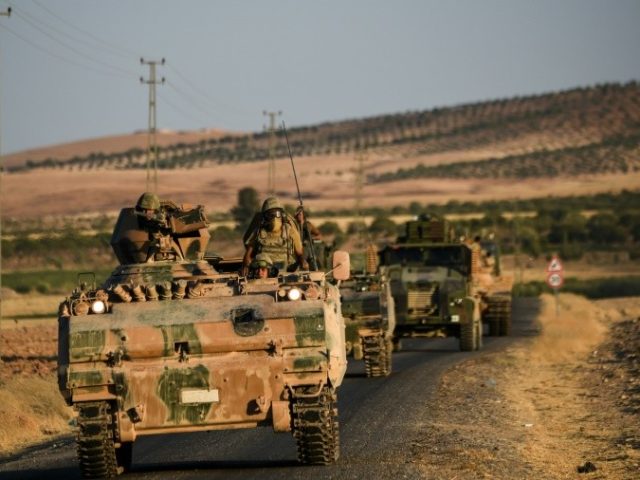Turkey is seeking a greater role in fighting the Islamic State in Syria, even hoping to collaborate with the U.S. military to liberate Raqqa, according to President Recep Tayyip Erdogan. The declaration has alarmed Russia, which is expressing “concern” at an expansion of Turkey’s military action in the region.
“Obama particularly wants to do something together [with us] about Raqqa,” Erdogan told the Turkish newspaper Hurriyet on a flight back from this week’s G-20 summit. “We have told him that this is not a problem for us… We said, ‘Let our soldiers come together, whatever is necessary will be done.'”
“From now on, we have to show that we exist in the region. We do not have an option to step back at this point,” he added, noting that discussions with Washington are ongoing. “What can be done on the issue is related to the U.S. stance,” he concluded. Erdogan made clear that any action against the Islamic State should also not benefit the Kurdistan Workers’ Party (PKK), a Marxist terrorist group that has also been fighting the Islamic State, but is at odds with the Turkish government and responsible for a string of terror attacks on Turkish police targets this year.
On Wednesday, the Russian Foreign Ministry responded to these remarks expressing “concern” over the possibility of U.S.-Turkish collaboration in Syria. “This calls into question the sovereignty and territorial integrity of the Syrian Arab Republic,” the foreign ministry said in a statement. “We call on Ankara to refrain from any steps which can further destabilise the situation in Syria.”
Turkey has a frayed diplomatic relationship with both the United States and Russia, and it is a vocal opponent of Syrian dictator Bashar al-Assad. While Turkey is a NATO country and nominal U.S. ally, the Turkish government has repeatedly claimed Washington has not expressed enough sympathy to Erdogan for the July 15 failed coup, which Ankara claims was orchestrated by Fethullah Gulen, an Islamic cleric in exile in Pennsylvania. Turkey is demanding America extradite Gulen immediately, though it has provided no evidence linking Gulen to the coup attempt. Turkey also
Turkey also objects to the U.S.’s collaboration with the Kurdish Peoples’ Protection Unit militias (YPG and YPJ), which it claims are an arm of the PKK. The U.S. considers the YPG indispensable to the fight against the Islamic State.
Erdogan has attempted to reset the American-Turkish diplomatic paradigm since accusing Washington of being responsible for a “sea of blood” in Syria in February, now hoping to cooperate on the ground after American officials warned the YPG to stay east of the Euphrates River, far from the Turkish border.
Relations between Turkey and Russia are even worse than those with the U.S. Diplomatic ties cratered last year when, after repeated violations of Turkey’s territorial sovereignty, Turkey shot down a Russian military plane illegally in Turkish airspace. Russia is Assad’s most prominent ally and rejects Erdogan’s demands that he step down. Erdogan nonetheless met with Russian President Vladimir Putin at the G-20 summit on Monday, and Putin made clear he was looking to re-establish diplomacy.
“There is still a lot to do in order to completely re-establish cooperation in all areas,” he told reporters. “I am sure that… we can go forward on our path of cooperation,” he added, noting that relations were almost “completely normalized.”
The immediate rejection of Erdogan’s call for a greater Turkish role in the liberation of Raqqa, however, indicates those relations are far from normalized.
At the summit, Erdogan once again proposed a no-fly zone over Syria, a move he has advocated for months, and is rejected by both the U.S. and Russia. As jihadist militias have no warplanes, the move would mostly affect the U.S. and Russia and ground Syrian military planes, grounding Assad’s fleet and limiting his use of airstrikes and chemical weapons on Sunni civilians.
“We do not think a no-fly zone would resolve the fundamental issues on the ground because there continues to be fighting on the ground,” White House national security adviser Ben Rhodes said this week.

COMMENTS
Please let us know if you're having issues with commenting.